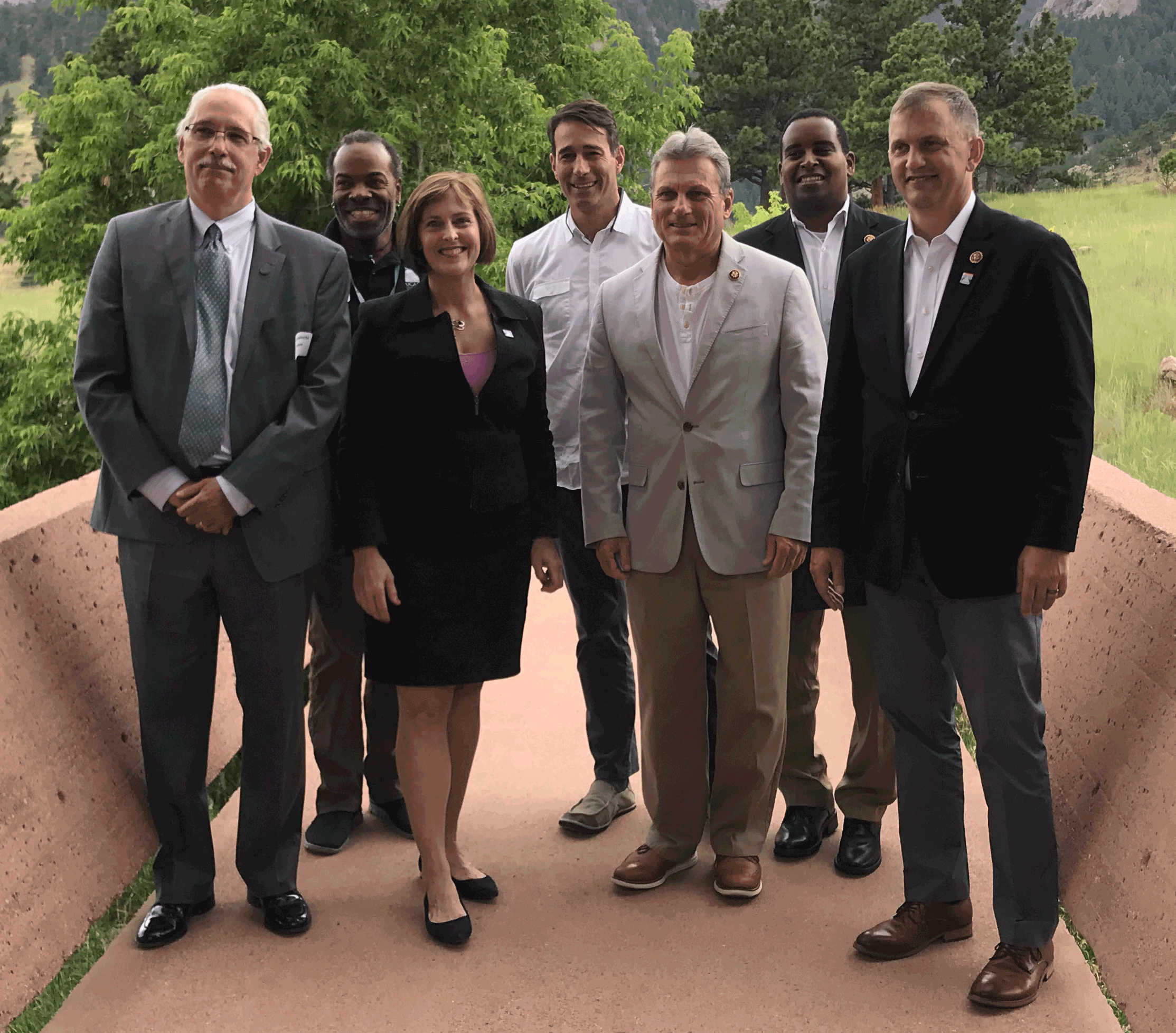Congressional visit to NCAR focuses on climate research, improving resilience
UCAR president, NCAR scientists brief visiting members of House climate committee
Aug 2, 2019 - by David Hosansky
Aug 2, 2019 - by David Hosansky

Members of the House Select Committee on the Climate Crisis visited NCAR on July 31 to meet with leading scientists. From left: UCAR President Antonio Busalacchi, UCAR Science Education Specialist Tim Barnes, Committee Chair Kathy Castor of Florida, Rep. Garret Graves of Louisiana, Rep. Earl L. “Buddy” Carter of Georgia, Rep. Joe Neguse of Colorado, and Rep. Sean Casten of Illinois. (©UCAR. Image: Alexandra Branscombe.)
A high-profile congressional panel visited the National Center for Atmospheric Research (NCAR) this week to learn about the latest climate-related research and strengthening U.S. resilience in the face of climate change.
Antonio Busalacchi, president of the University Corporation for Atmospheric Research (UCAR), welcomed the members of the House Select Committee on the Climate Crisis. He highlighted UCAR and NCAR's many partnerships and their research into weather and climate.
UCAR is a nonprofit consortium of 117 North American universities and colleges that manages NCAR on behalf of the National Science Foundation.
Busalacchi discussed key priorities for helping the nation better understand, and prepare for, the potential impacts of climate change. These priorities include:
"The challenges we face today cut across multiple disciplines," Busalacchi said. "The Earth is a coupled system and we can no longer look at any one constituent by itself. We need a seamless approach across space and time scales and the supercomputing resources to enable that."
Such a strategy, he added, would help scientists provide actionable information to decision makers.
"This is very impressive," said Rep. Kathy Castor of Florida, chair of the select committee, referring to the breadth of UCAR partnerships.
Strengthening resilience
NCAR scientists Dave Gochis and Olga Wilhelmi highlighted new advances in predicting streamflow and flooding, as well as research into helping vulnerable communities prepare for such climate-related threats as extreme heat waves and coastal inundation.
Gochis provided an overview of the NCAR-based Weather Research and Forecasting hydrological modeling system, or WRF-Hydro. This technology, which has been incorporated into the National Oceanic and Atmospheric Administration (NOAA) National Water Model, enables forecasters to predict detailed streamflow and flooding conditions across the United States.
Streamflow levels and flooding have emerged as an increased concern because of the influence of climate change on precipitation, flooding, and drought.
"Technology is transforming knowledge and prediction of water risks,” Gochis said. “We are working with our partners to expand water intelligence so we can provide integrated guidance to the people who need it.”
Wilhelmi highlighted research into understanding and reducing the growing risks of climate change, which is leading to more extreme weather events. She focused on the threats posed by increasingly intense heat waves and coastal storm surge.
Wilhelmi and her colleagues, using geospatial technologies, are working with communities to identify vulnerable populations and to develop tools and applications to increase resilience.
"Climate and society are co-evolving in a manner that can place more people at risk from weather-related hazards," she said. "We are working to provide very specific information to help decision makers understand where to target their resources and what types of interventions would be most helpful."
The congressional representatives asked questions that touched on a number of topics, including the best ways to communicate forecasts, the threat of groundwater depletion, and the risk and promise of geoengineering Earth's climate to potentially offset warming temperatures.
In addition to Castor, the committee members who visited NCAR on Wednesday included Earl L. "Buddy" Carter of Georgia, Sean Casten of Illinois, Garret Graves of Louisiana, and Joe Neguse, who represents the Colorado district where NCAR is based.
The committee members also met with local scientists at NOAA and the National Renewable Energy Laboratory on Wednesday. They held a field hearing in Boulder the following day with testimony by Colorado Governor Jared Polis, Boulder Mayor Suzanne Jones, and other officials.
The select committee has been tasked with delivering major climate policy recommendations to Congress “to achieve substantial and permanent reductions in pollution and other activities that contribute to the climate crisis.” Its first recommendations are due next March.